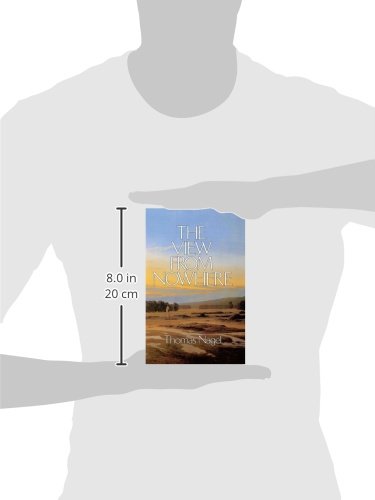Customer Services
Copyright © 2025 Desertcart Holdings Limited




The View From Nowhere
M**E
a deep exploration
The long and successful march of scientific and technical knowledge has introduced us to manifold viewpoints, many of which are quite alien to the comfortable or traditional views we grow to accept as the inner views of our lives. These larger views transcend science in their significance as they impinge on our inner views and ways of thinking and operating in the world. The result is an asymptotic view, a view from nowhere, that has gradually manifested itself in our cultural consciousness. Prof. Nagel explores these inner and outer contradicting viewpoints, and especially within the context that these views are at least partially forced on us. Simply adopting a highly personal inner view, or subjective view of life, or a highly detached impersonal view, or objective view, may seem to be extraordinarily appealing, but this appeal, according to Prof. Nagel, is illusory. He thinks that we are caught in an ineluctable struggle within the context of these opposing views, with a result that life seems, at least in part, absurd. This book is a brilliant, deep attempt to struggle with this conflict, by considering a multiplicity of arguments that arise once one accepts the conflict, and the curious necessity of having to accommodate, within one's individuality, the view from nowhere. I find that he develops numerous somewhat complex ideas, and the result is that it has whetted my appetite to read more of his work. He seems to be developing ideas that have an important bearing on contemporary life.
E**.
Great content
The volume was efficiently delivered. Nagel, with his cogent style and fruitful insights, never fails to deliver.
L**.
Related to the Stoics Ideal State of Being
I was reading Paul and the Stoics by Troels Engberg-Pedersen and he was describing the ideal that a person should be striving for as a goal, and towards the "good life", according to Marcus Aurelius, who Troels is using for an example of a Stoic, since he wrote out a systematic description of those beliefs. The ultimate state to be in, as a result of those efforts at self improvement would be able to see things as one who was looking from above. Then Troes has a note describing discussions on this subject and suggested The View from Nowhere by Thomas Nagel, for a modern treatment. Really what it means from a Stoic viewpoint is what they thought of as seeing what was "real" and to find a "natural" way of fitting into that reality. Of course this is just my take on it from reading just this one book on the Stoics, plus studying Aristotle's Metaphysics for one day, and reading a good blog on Aristotelian philosophy. So, I thought I would expand my understanding of this idea by going ahead and ordering this book, by Nagel, trusting Troels as being a good and qualified person to make such a recommendation. I placed my order, and when I read some of it, I can update this review, since it does not seem like there is a short time limit on editing them.
J**D
Clever but
The overall thesis is interesting. How to link the gap between the subjective and the objective. Sometimes his honesty detracts from the writing. Why should we read chapters that start with I don't think this is right but I don't know what to replace it with. Not exactly a stirring motivator to read on. I found the chapter on ethics thoughtful. Some of the middle chapters were a tough read and fuzzy. It is still a cited book with good reason and worth the effort.
D**Y
Most difficult philosophy book I have come across. Who is the targeted reader for this?
A little hard to follow. OK a lot. Promised myself I would finish it and I did. That has got to be worth something. From my perspective. Where ever that is.
W**.
First-rate philosophy
This is among the best books I have ever read. In a series of chapters covering a range of philosophical topics, Nagel considers whether our subjective view of things is reconcilable with an objective (scientific) view of the world. Nagel manages to expertly navigate through these subjects with convincing, compelling arguments. Of the material I have read by Nagel, this is topnotch.
S**N
I loved the book
I loved the book
W**W
well done
begin by understanding you are insignificant, that time is an illusion, that space is connected to that illusion and then launch yourself like a pea in a straw at lunchtime in a junior high school cafeteria.
V**T
The problems of objectivity
This magnificent analysis is accessible to a general reader who's already fascinated by philosophy and familiar with some of its perennial problems. The "view from nowhere" is the human attempt to get beyond a me-centred world-view, as a basis for all the components of civilization. In thinking, we have two instruments at our disposal: subjective and objective. They don't serve the same purpose. They may give different readings. Neither is fully reliable. Yet we are dependent on both. Reading this book one discovers that living as a human being is even more complicated than one already thought.
鳥**頭
Thomas Nagelと言えば
"What it is like to be a bat?"が有名だと思いますが、私にはこちらの本のほうがおもしろかったです。ヒトの思考には、subjectuveな視点とobjectiveな視点の2重性があり、多くの哲学的問題にはこの2重性が関与しているという指摘は面白く説得力があるように思いました。まあ、私は素人なので、本職の哲学者がどのように評価するのかわかりませんが、確か中島義道氏が『否定の哲学』かどこかで脱自己中心化とか再自己中心化というような概念を述べていたように記憶していますが、Nagelの指摘と通じるところがあるようにも感じました(間違っているかもしれませんけど)。
I**N
Five Stars
very good
O**D
a perfectly defined problem with no perceivable solution
The main thesis of this book is that objective/subjective perspectives create an unavoidable tension which affects virtually all aspects of philosophical enquiry. Where Nagel excells is in outlining the problems that such radically different perspectives can create; particularly within the fields of ethics and existentialism. Where he is considerably less affective (possibly to the point of being outright awful) is in providing a solution to these problems.In almost every area of philosophy - metaphysicals, politics, ethics, Nagel again and again fails to resolve any of the tension between these radically opposed perspectives. What is perhaps more frustrating however, is the obfuscating waffle routinely emloyed to fill the gap between the definition of the problem, and the solution that never comes.You only have to read Nagel's famous "what is it like to be a bat?" to see what a severe problem of Nagel's this has always from the very beginning of his career. The descriptions of consciousness in that essay are amongst the most lucid descriptions ever commited to print. His last ditch attempt to provide a normative argument however, reprensents the very worst in pseudo-intellectual waffle.Sadly the exact same is true here - the descriptions of existential crisis and ethical dilemma are the best you are likely to encounter, but Nagel does not seem to have the intellectual capacity to provide a coherent precise solution to any of the problems he outlines. But since so much of the text is this book is cloaked in dense, impenetrable sophistry, many will probably come away thinking he's actually put some kind of argument forward. Look very closely though, and you'll see that the most he ever commits to is an anti-physicalist, anti-utitliarian stance. Beyond that, i believe its almost impossible to pin Nagel down on anything.This is a great shame because the object/subjective dichotomy is the 'fly in the ointment' for just about any philosophical position going. Unlike Nagel however, most philosophers either do not seem to be aware of this problem, or do not want to accept that the problem exists in the first place due to the disastrous consequences it can have on a philosophical project once consciously acknowledged.This is partly i think why the physicalist programme has proven so popular over the years. While we can never meaningfully define consciousness (the first person perspective) with third person tools, physicalists like Dennett at least provide a solution, the possiblity of philosophical and scientific progress.While I believe Nagel's rather than Dennett's position has the weight of evidence and reason on its side, there is never any chance of such a position being popular when philosophers like Nagel throw their hands up in the air whenever pushed to provide an alternative method to the brute accumulation of 3rd person facts.Until someone comes along and attempts to do this (and Nagel certainly isnt) we are stuck with the prevailing philosophical dogma: 'neural events are identical with mental states'. Which while empricially unverifable, at least offers some sort of beacon of hope for those who want to get to the bottom of consciousness.While Nagel in this book has more than competently illustrated the inadaquacies of philosophical atomism, he has as yet i believe, managed to provide to a coherent alternative solution.
Trustpilot
2 weeks ago
5 days ago